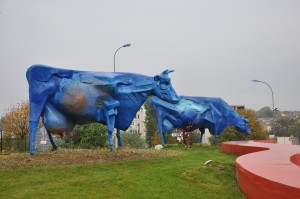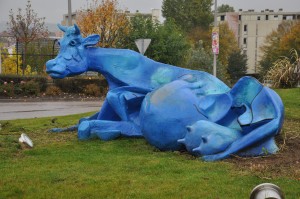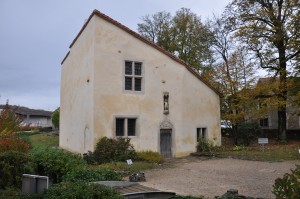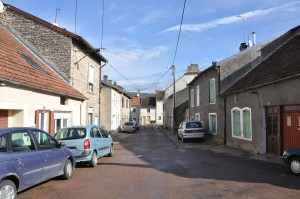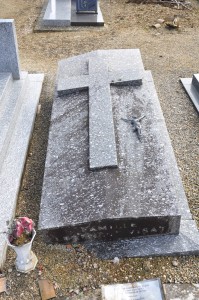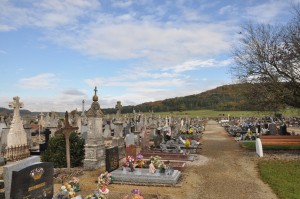I lay in bed and listened to the rain insistent on the roof. We would go to Liffol-le-Grand, I decided.
Liffol-le-Grand is one of the small towns near Neufchatel, an administrative center of the American Expeditionary Force, which provided housing for soldiers. It was where, in late October, my grandfather David Cutler was billeted with the family Lorenzo (or more correctly “Lorensot”). On October 25, 1917, oddly enough exactly 94 years to the day before I visited that town, he described his new life to his family back home. Here are David’s words:
Settled at last! After very nearly a month en route. But here is our home, and we can look forward to a few months of undisturbed work, we hope.
Monday night…we formed at 8:15 to entrain. The cars were only a little way from the camp, and we were soon lined up on the platform, but it was 10:30 before the troops were all on board, and 1:30 before we pulled out. We were very fortunate in getting 3rd class carriage instead of boxcars… Officers were nicely fixed, as usual…The baggage and rations being finally a board, we pulled out of the station and began what turned out to be a very long and tedious trip. Ordinarily a troop train could make it in 11 hours but it took us just 34 hours…We travelled away around south of Paris and covered an astonishing large part of France…At last we arrived…We then proceeded with the interesting process of “billeting.” The company marched down the street under the direction of an officer detailed to house the troops. Each house is labeled [Officers Horses Men], with the number of each of which can be assigned to that house. I say house, but it is invariably barns, although it’s very hard to tell a house from a barn here. It is a very old town, and nothing but rambling tumble down stone houses, with yards, alleys, barns and houses all muddled up….My platoon split up, and is in 5 different buildings on two different streets…After the men were quartered and fed, they took the officers around, and assigned them to quarters…And it’s simply great! I never dreamed of such absolute and complete luxury in the field…[There is]an enormous feathered bed, round center table, small writing table with 2 drawers, 2 shelves, 10 books, big stone wash stand, 2 big cheers + several small, and a stove! Oh the stove is wonderful, and we bought 2 big bundles of wood for un franc, aujourd’hui.
…The people in the house are wonderful. Just as polite and anxious to make us comfortable as though we were wealthy relatives. There are about 4 old ladies, who run the telephone + telegraph office in this building, and one old man, and they can’t any of them speak a word of English… The service those ladies give us is remarkable. Hot water at any and all times, and one of them did more sweeping and dusting this morning than I have seen in many a day. Caught her dragging out shoes to scrub, but we drew the line on that…
On the way we were detoured and learned a new word: “déviation.” We deviated through Commercy, a good thing as it turned out as how else would we have discovered those blue cows?
The next déviation impeded our impulsive sidetrip to the Maison Natale de Jeanne d’Arc in Domrémy. We got within a few hundred meters of that sacred spot and found ourselves blocked. A kindly fellow invited us to park on his sidewalk, so we set out on foot, skirted a major excavation, flouted yellow-tape barriers and finally approached a small but hardly humble lodging. Ah, but it was Tuesday and the house, the associated museum and art gallery, as well as the tourist shops and apparently the entire village were all closed. No souvenirs of that sainted Jehanne, no small objects through which we might claim her blessings.
A few minutes later we entered Liffol-le-Grand and halted by the museum, also closed, to enjoy the small lunch we had packed. There was a bottle of local red plonk, a savory pastry stuffed with paté bought from the bread-truck lady, local apples and a sachet of favorite indulgence, pates de fruits (two each of apricot, coing, myrtille and cassis). Blessed Serena guided us to the rue du Four, the street where David had lived with the Lorenzots.
It is a charming small street, mostly well-kept houses and one near-total wreck of a building. As we arrived, a lady scooted out of her corner house to welcome us. Apparently she was expecting someone else. As it turns out, her husband is the president of the local genealogical society; that could be handy. I wandered up and down the rue du Four, and around the block, taking pictures while my dear one read a book about Verdun. The rain had stopped somewhere past Domrémy and the sky was now a sunny blue.
I determined nothing. No house spoke up and claimed David as a past resident. The friendliness of that place—and every person I passed in Liffol wished me “bon jour”—made me imagine a warmth that might have enveloped David.
We drove around the centre ville a bit, looked at the church, and suddenly found ourselves headed out of town. Ahead of us was the cemetery, so I stopped, wondering if there were something there. On the gate, a plastic-sleeved sheet provided a list of the dead, the aisle where their tombs might be found, and the placement of the tomb in that aisle. I passed my finger down the list. There it was: Visat-Lorensot. I walked to the central avenue in that orderly necropolis and looked at the signs. I followed the alphabet backwards: T…S…R… N…M…L… J…I…H…G.
I halted at G17, an austere, gray-granite tomb, moss encrusted and akilter on the sandy ground. I made out the names, her family name “Visat” and his name “Lorensot,” and then the memorials. Léonie Lorensot, 1860-1928. Paul Lorensot, 1867-1929.
The bonds between this kind couple and my family endured. In July 1926 Mme. L. sent David’s sister, my godmother Aunt Helen, this letter of heartfelt condolence (excerpted and translated from the original French):
My Dear Friend,
We were much distressed to read your letter. The joy of seeing our much-loved brother after having been tested by the terrible fears of war, then following the happiness of seeing him married as we hoped, all this great pleasure was to last so few years.
This cursed war not only left millions dead on the battle fields, but thousands dying later = and dying = a hundred more = victims of exhaustion endured or wounds received…
We feel in our heart your great sadness, my dear Friend, as well as that of your whole family, and particularly that of your poor Sister-in-Law. God wished to spare him at least deep worries on the subject of the health of his dear children.
I looked once more at the grave and said silent thanks for their doting care of my grandfather, the affection extended to my family, and the transcending relationship between two countries of which this is all a part.

